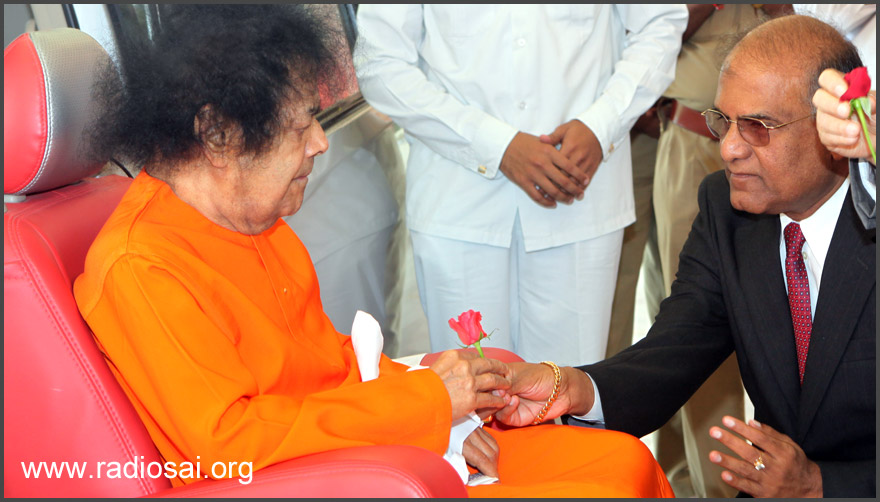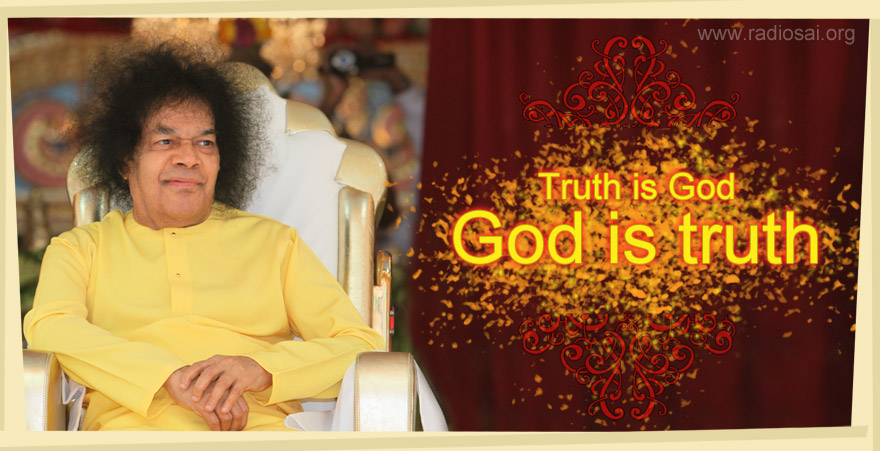|
|
| 'Like' us on Facebook | Follow us: |
Posted on: Mar 31, 2014
The Eight Flowers That Please God
by Dr. Narendranath Reddy
Part 02
 |
The third flower to offer God is sarva bhootha daya pushpam, compassion for all beings. Swami says we should have compassion for all, not just for human beings. Jesus has said that when we serve the least of our brethren, we are serving the Lord. Swami has said that service to man is service to God. Our love should be for all beings, including animals and plants, for everything is permeated by God. For example, Sri Ramana Maharshi, the saint from Arunachala, felt one with all.
Once when somebody was cutting the branch of a tree, Sri Ramana stated, “Oh, somebody is cutting my arm…,” because he could identify himself with the tree. Similarly, when someone was walking on a grass lawn, Sri Ramakrishna, the nineteenth century Bengali saint, said, “Somebody is walking on my chest.” He could identify himself even with the grass.
Swami has respect not only for animals and plants, but for all creation. About thirty years ago walls were being built around the ashram. After building the cement walls, the custom is to spray water on the cement and a worker was spraying water with a lot of force. Bhagawan Baba, the Avatar of this age, was on the balcony watching the man and sent a message, “Tell him not to water with so much force.” Everything has consciousness including the inanimate objects. Swami says that when we walk we have to respect the earth and walk gently. Swami has said that everything is permeated with divine consciousness. So we need to have love and respect for everything in creation.
 |
The fourth and most important flower to offer to God is kshama pushpam, the flower of forbearance, fortitude. This is an extremely important quality for the spiritual seeker. Lord Buddha is an example of fortitude. Lord Jesus was also an example. When He was being crucified, instead of cursing his antagonists, Jesus said, “Father, forgive them. They know not what they do.” When Bhagawan Baba had a hip fracture, despite the pain and inability to walk, He maintained His routine as if He had no problem. He gave darshan, read letters from thousands of devotees, blessed innumerable people, and granted their boons. Swami is an exemplar of divine love and forbearance.
 |
Swami also talks about the following incident in the Mahabharata, involving Draupadi. Draupadi’s sons were all killed by Aswatthama. Naturally, being a mother she was grief stricken and was not happy that Aswatthama killed her sons. But, when Aswatthama was brought before Draupadi for justice, instead of punishing him or giving orders to kill him, she forgave him, saying “I know how much pain your mother will feel at your death.” Swami says that is the greatest example of kshama, forbearance and forgiveness.
I have heard of a similar example in our time. The only son of Althea, a devotee of Swami and mother-in-law of Charles Penn, was murdered. Althea went to the prison to meet the man who killed her son. People were concerned about this meeting but, to everyone’s surprise, she did not condemn the man. Instead she forgave him. She said, “I don’t know why you did this. May the Lord bless you and forgive you.” So, even in this age, examples of incredible forgiveness and forbearance occur.
 |
Another flower to offer God is santhi pushpam, the flower of peace. Swami has said, “Everybody wants peace.” Paul in his letter to the church at Philippi mentions the “peace that passeth all understanding.” (Philippians 4:7) Swami refers to a higher level of peace than most of us know. He talks about prasanthi not santhi. Santhi is peace. Prasanthi is supreme peace, the “peace that passeth all understanding.”
We tell Swami, “I want peace.” In response, Swami tells us the simple way to achieve peace. He says “Remove the ‘I’ and remove the ‘want’.” Then all that remains is peace. The reason we don’t have peace is because of our ego—the “I”—and our desire—the “want.” When we have too many desires, we are inevitably agitated. The whole purpose of spiritual practice (sadhana) is to minimize our ego and to minimize our desires. Swami says that man minus ego and man minus desire is God. As soon as the ego leaves, one realizes the inner divinity.
 |
 |
Another flower to offer God is thapo pushpam, the flower of penance. A spiritual seeker should do some penance and austerity. Every tradition knows this. For example, during Ramadan, Muslims fast for 30 days. Catholic Christians observe Lent for 40 days. Hindus observe Shivarathri with vigil and fasting. But the real penance for this age, Swami says, is practicing unity of “thought, word, and deed,” trikarana suddhi. What we think, what we say, and what we do should be harmonious. However, the opposite is true today. Harmony in thought, word, and deed is rare to non-existent. That is why peace is lacking these days.
Swami gave the example of a home in which the family members are not in harmony: the father is doing one thing; the mother is doing something different; and the son is doing something else. Each one is going a different way and unity is absent. Harmony will not come to such a home. The same problem exists in us, as individuals. If we have harmony of thought, word, and deed, we will have peace. This trikarana suddhi is the real penance for this age rather than mere physical penance. The physical austerities such as fasting or doing vigil are fine but we should all practice harmony in our thoughts, words, and deeds. That is true penance.
 |
The seventh flower is the pushpam of dhyanam, meditation. Dhyanam is a good spiritual practice. Every spiritual path describes some type of meditation. However, rarely does anyone practice true meditation. Swami says that, in real meditation, if we think about God even for twelve seconds with concentration He will appear before us. Most people think that they are practicing meditation but their practice is not true meditation.
Swami says, “Real dharana lasts only twelve seconds.” Dharana is twelve seconds, a unit of concentration. One unit of meditation is twelve dharanas, one-hundred-and-forty-four seconds. If we meditate truly for two minutes and twenty-four seconds, we complete one unit of meditation. We sit trying to meditate for two hours but we are not truly meditating. Twelve units of meditation become samadhi. If we meditate truly for twenty-eight minutes and forty-eight seconds then we attain samadhi. Meditation is not an easy discipline. But Swami says that every act we do in life—drinking, eating, sleeping, talking, walking, driving, and working—becomes meditation if we offer it to God. Therefore, we should offer everything to God as a flower of our worship.
 |
 |
The eighth and final flower of our worship is the flower of truth because truth is God. God is truth. We all know the story of Lord Rama. In order to honour His parents and to follow the path of truth, He gave up His kingdom and went to the forest. Similarly, Emperor Harishchandra, for the sake of truth, gave away his kingdom and his family. He gave up every worldly thing for the sake of truth. Of course our dear Swami is the very embodiment of truth. His very name is Sathya Sai Baba. Swami says that for Him truth is most important. In the past, Swami had many kings and other royalty as devotees. They wanted Swami to come and live in one of the cities near them.
Swami’s mother, Easwaramma started crying on hearing this and prayed that Swami would never leave her and Puttaparthi. Then Swami gave His word, “I will never leave Puttaparthi and this will become a place of pilgrimage. This is the punyakshetra (the holy pilgrim Centre).” He kept His word and made Prasanthi Nilayam the holy land for all Sathya Sai devotees.
 |
Another example of how Swami kept His word was His promise to Karnam Subbamma. Swami told her, “I will be there at the time of your death.” When Subbamma was on her death bed, Swami was physically a few hundred miles away. Some people said, “Swami gave His word to be present at the time of Subbamma’s death, but He is not here to fulfil the boon He promised to Subbamma.”
Swami came back finally and everyone told Swami that Subbamma had already passed away. Swami went straight to the place where Subbamma’s body was kept. Swami then said, “Subbamma, look at Me.” Lo and behold! Subbamma opened her eyes and Swami poured the water in her mouth just as He had promised her. Subbamma then left her body peacefully.
In summary, we should offer these eight flowers of worship to God. This should be our New Year’s resolution. Instead, people make all sorts of resolutions that they do not keep. I see this problem frequently in my medical practice. I treat people with obesity. Many of them make a resolution to lose weight. They often lose twenty pounds in one year and gain forty pounds in the subsequent year. We must have determination. We must make good resolutions and follow them. Swami tells a nice story that reminds us how our negative qualities are always ready to return.
The Nature of our Negative Traits and How to Deal With Them
A husband and wife, a generous couple, were good hosts. When guests came to their home they treated them well. A guest came to stay with this couple and told them he would stay with them for three days. As usual, they treated their guest well. They gave him breakfast, lunch, dinner, and snacks in between. But this guest didn’t leave after three days. He was still there after one week. Subsequently, the couple became concerned and thought about how to make him leave. They cut out the snacks and served only breakfast, lunch, and dinner. But the guest still didn’t leave. He stayed for yet another week. The hosts cut back from three meals to two meals a day, lunch and dinner. The guest still did not leave. Yet another week passed and the hosts decided to give him only one meal, dinner. The guest still did not leave.
The guest had become a pest. So the husband and wife played a drama. They pretended to fight and made a big scene. The guest became scared, packed up his stuff, and left. The husband and wife celebrated his departure and congratulated each other on their great acting. Then they heard a knock at the door. To their surprise, the unwanted guest had returned, saying that he acted even better and he was coming back to stay. Similarly, our negative tendencies—anger, jealousy, and greed—are deep rooted and lurk in our subconscious mind. We may think that we have controlled them but they are ever ready to return any time. So, we must be vigilant.
Swami cautions us, “Always be vigilant. Always be careful.” We need to constantly do a self-audit so that we maintain the good qualities that please the Lord. In this New Year, let us all strive to offer our Lord the real flowers of worship and let us be determined to always please Him.
Samastha Lokah Sukhino Bhavantu (May all the worlds be happy).
Thank you.
- Team Radio Sai
What do you think about this article? Please let us know by writing in to h2h@radiosai.org. Do not forget to mention your name and country.







